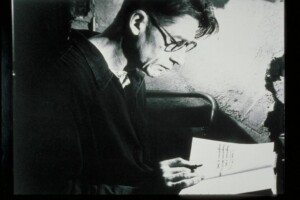13:08 Jessie Johnson

Share this
It is 13:08 during a forgettable autumn and I am waiting for a friend.
A sharp corner and blunt trauma has led him (and me) to radiology. I don’t know the details. If it weren’t for the coughing of a nearby child or the humdrum syncopation of the nurses’ rounds, this room would almost – almost – be quiet. There are no windows, and the receptionist is a wide LED banner that blinks for each new patient. The light in the centre of the 8 is broken, and for a moment I wonder if the 8 is a 0 and time really is as slow as it feels. But soon the 8 will turn to 9 and then to 10 and I will hear the click-clacking of my friend on his crutches. I will not know what to tell him.
I will want to tell him not to worry – that his worst-case scenario is the few days off work he can almost afford. On-site within a week; up ladders within a month. I will want to tell him not to think of meetings with bosses, of ironed white shirts and people with lanyards. But as soon as I see him, I will think of my father.
My father exists in two forms: the man he is and the man he was. When I was a child he’d swing me and my sister from both arms with ease. Thirty years a labourer. Before that, a boxer; before that, javelin. Big man. Strong. Tall. Proud. But when I visit home now, I help him move the furniture he once built.
He is old. Tired. Spent.
I’m told there is little dignity in labour, but my dad made a living. 5am each day, head down, feet forward, that man worked his job into his sixties. No complaints. No retirement. He found a job he could do and did it until he couldn’t. One day he came home, leg in cast, and never went back.
This is how labour is lived. It is not Lunch atop a Skyscraper; not men smiling with papers and cigarettes. It is builders gripping girders with ropes and calloused skin, painted in dust and oil and blood. It is my friend falling from scaffolding sixteen feet to fracture his knee. It is my father pushing machinery; it is his body. It is the chip, chip, chipping away of a person. It is Radium Jaw, Welding Shivers, Designer’s Thumb, and Farmer’s Lung. Part by part each worker trades bits of their bodies for minimum wage; the only thing that changes is the job or machine or person lining up with a different piece of themselves to give.
This is how labour is done: it is labour lest ye stop. My father used to clear fields for building sites. He was a gardening associate. (He was a lawnmower man.) He once came home with legs a patchwork of blood and dents. In asking what happened, he explained the job of a gardening associate: fields need clearing for building sites. His job was to handle machines. Attached to each was a silo – the motor of the blades would push detritus into the silo for transportation. He then explained the job of a lawnmower man: he cut grass. Emptying silos took time. They were removed, meaning rocky shrapnel would fly alongside the grass, out the mower, into his legs. Struck both with awe and grotesque in a way only a child could hold, I remember asking what he did whilst walking if the rocks were gigantic. His response: ‘I keep walking.’
This is how labour became: the Black Death killed a third of Britain. Fearing able-bodied survivors would leave their parish for better work, the Poor Law Act of 1388 fixed labourer’s wages and restricted their movement. Not abiding was met with time in the stocks until surety was paid to return to one’s town. Britain’s first labour law was paired with humiliation, and the expectation that you’d find your own way home.
This is why I worry for my friend. For the truly poor, a P45 is more frightening than a doctor’s note. Right now he has his body, and his job. If he is lucky, he’ll keep the latter. In some strange way he will believe the government will provide: work, benefits, at the very least, food. In a more realistic way, he will acknowledge his choices. DWP, PIP, UC, JSA, ESA – it takes a lot of letters to ask for help these days.
I know a woman whose sector is being automated. Maybe this is good: I don’t know who mourns the analogue clock, but I do know that dust-ridden factories aren’t healthy. My friend lost employment when her lung collapsed. The last time she went to a job centre, she began to wheeze. Her airways tightened. She couldn’t walk. Couldn’t talk. The employees wouldn’t get her water, let alone a taxi. She was mute. Stuck. Afraid. Alone. Is it not possible to see how people will keep jobs they shouldn’t in order to avoid this? ‘5am each day, head down, feet forward’ – who does manual labour into their sixties?
I’ve been told that automation gives more jobs than it takes. ‘Labourers: retrain! Dream of a better life.’ But after a life in one setting, who changes so surely? Is change as attainable for the always-tired? Maybe living so close to the fringes of poverty means people tend not to sleep so deeply enough to dream. I used to volunteer, helping people find employment. One week I was helping a man who couldn’t afford toothpaste. Six months later he couldn’t afford dental care. Ignore the Benefits Street-style poverty-porn: poorness is no complacent living.
The oddity is that the poor are still blamed for not working. This is wrong. A person will always prefer to do something in exchange for something than nothing in exchange for nothing. By our nature we earn our bread by the sweat of our brow, but I have seen politicians defend sanctions and poverty lest people disrespect ‘the system’. It deserves none. I will start respecting this system when people declared fit for work stop dying in job centres. If the rules that wrap around the poor in python tightness only exist for claimants who ‘cheat the system’, then let them cheat. I no longer give a fuck. Those angered over payment due can talk to me of Bezos or Zuckerberg first.
It is 13:08 during a cold, bright day in autumn and I am worried for the future. I am thumbing the cord of a phone one friend could have packed in a factory the other could have built on land my father could have prepared. I move back, and I see all three exist like inevitable cogs of a clock that won’t stop ticking. And I wonder: where does this end? I move further and see the migrant workers on ships bringing lawnmowers and phones to England. Tick-tock. Then again to the workers in Shenzhen who, when work-related deaths by suicide began to surge, were provided with jumper nets rather than labour laws. Tick-tock. I think of the child miners in central Africa – each one working to provide the cobalt or tin or gallium for our phones, laptops, children’s toys. Tick-tock. 700 years of labour laws. I do not need to look out the window to see some part of this is deeply broken.
Two minutes will not be long enough to decipher the great misfortune and fortune of our place in the 21st century. I will worry. I will have no answers. The 8 will turn to 9. The 9 will turn to 10. The click-clacking of crutches will soon alert me of my friend. I will put down my phone, stand to great him, and I won’t know what to say.
Written for UWE Bristol’s ‘Ideation, Platforms and Commercial Writing’ module in the Faculty of Arts, Creative Industries and Education


